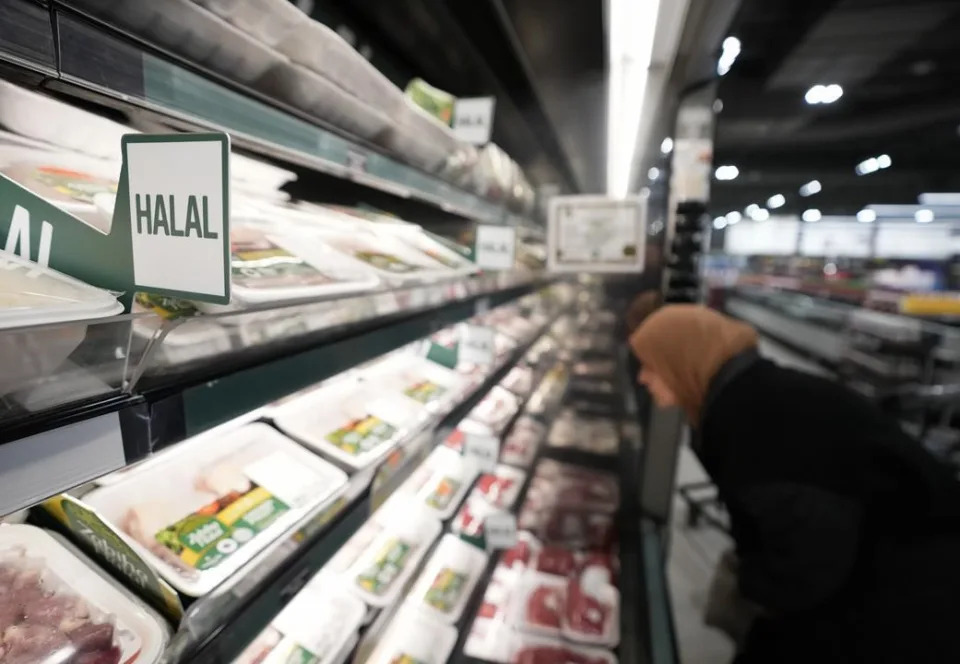By Marwan Hassan – The National UK
Shoppers look for budget-friendly supermarket grocers
Every year, Iman stocks up on essentials during Ramadan for the rest of the year.
But the mother-of-four from Kent has decided not to buy dates at all this year because of the cost of living crisis in the UK.
Her preparations for Ramadan have been impacted by staple items becoming prohibitively expensive, Iman told The National.
After taking a close look at expenditure on her weekly groceries, Iman now shuns the stores she once frequented. Instead, she buys vegetables and fruit from streetside stalls and shops at Tesco for other goods, including meat and tinned food, because prices are much lower.
“My weekly shopping has increased by £30 a week,” she said. “Some of the larger supermarkets kept their prices low for a short while until their stocks ran out, then they started charging more.”
As a result of the increase in prices, some regular Ramadan items such as dates will be missing from Iman’s table this holy month.
Dates turn expensive
They are simply no longer affordable, the cost having risen sharply to about £10 per kilogram from between £4 and £6.
“The price has gone up considerably, and I decided it was something to cut back on,” Iman said.
Checks by The National found that the price of Medjool dates in London shops ranges from £9 to £15 per kg but they were cheaper in Tesco at £4.19 to £5.60 per kg, followed by Asda at £6 per kg and Sainsbury’s at £7 per kg.
In a Facebook group created to bring Egyptians in the UK together, one woman said that she compared the prices of dates in her local shops with supermarket brands.
She suggested that the larger supermarkets were buying in bulk and were therefore able to offer better prices than the local shops.
British Retail Consortium spokesman Tom Holder confirmed that the big supermarkets used their bulk-buying powers to garner better deals. “They are then able to pass some of the savings on to their consumers,” Mr Holder told The National.
“The 10 largest supermarkets account for over 96 per cent of food in the market. This is to say that less than £1 in every £25 is spent outside of the large supermarkets.”
As Asda explained, “the scale of our buy, along with the great relationships we have with our suppliers and sourcing networks, means we can pass on these savings and provide great value for our customers”.
:quality(70)/cloudfront-eu-central-1.images.arcpublishing.com/thenational/3EHHLGLHBNESNNGGLQZZPJPUDE.jpg)
Survey shows impact of cost-of-living crisis on spending
Iman is far from alone judging from a recent survey by the advertising technology platform Nano Interactive, which revealed that many others are expecting to cut back on Ramadan spending because of the rising cost of living.
Forty-eight per cent of respondents said the economic situation had already affected their Ramadan and Eid preparations, while 45 per cent expected to work more hours to try to meet increased living costs this year.
Of those surveyed, 41 per cent revealed they were less likely to eat out for iftar, the evening meal that signifies the end of the daily fast. When it came to spending on Eid gifts, 42 per cent were expecting to pay less than £30 per person on Eid gifts with 61 per cent describing the outlay as lower than last year.
Maximising savings while grocery shopping
One of the biggest changes for many will be their shopping habits, with 34 per cent choosing to save on groceries this year to address rising living costs. More than 40 per cent of respondents said they turn to budget-friendly grocery stores when preparing for Ramadan and Eid.
Many brands across the UK are attempting to engage British Muslim consumers around the holy month preparations.
Asda, one of the UK’s major supermarkets, has dedicated Ramadan aisles in 150 stores, a 47 per cent increase from last year. The products vary from halal produce to tinned ingredients.
Abeer Ali said she decided to venture farther to find Ramadan products that were better value for money.
She told The National: “I compared the prices and found some items are cheaper when bought in bulk. Dried fruits in local shops have become very pricey, but I found good deals in Costco, which sells them at wholesale prices.”
:quality(70)/cloudfront-eu-central-1.images.arcpublishing.com/thenational/WC6UPQPLY5ECVKFOCP6WHWV3XU.jpg)
Enticing shoppers with deals and unique items
The survey by Nano Interactive showed that 44 per cent of UK Muslims would describe themselves as brand loyalists, typically purchasing those they know and have come to love.
Londoner Hesham, a shop owner, came to the realisation that it was not feasible to try to match or even compete with the larger stores in Ramadan offerings.
“I decided to focus on products that my customers like but are not available in larger stores,” he said.
“Karak Chai, imported frozen vegetables from brands that my customers are familiar with from back home, as well as traditional Ramadan drinks, are all very popular and not found in the supermarkets. These are my unique offerings and this is what my customers come to me for.”
Hanan Zein Eddin, from Oxford, said that she had chosen to make her own decorations.
“I can buy things for a fraction of the cost from the discount stores around the year and customise them to fit the theme of Ramadan,” she said.
“This doesn’t only save me a lot of money,but it is also more fun, especially as my daughter has been trying to create her own decorations, too”.
Huda El Rouby told The National that she asked family in Egypt to help source clothes, furnishings and decorations that they then shipped over to her.
“It wasn’t just about the cost. I wanted things that I didn’t find in the UK. The cost of shipping wasn’t much but it was worth getting something I would like,” she said.
:quality(70)/cloudfront-eu-central-1.images.arcpublishing.com/thenational/UII6EYTZHE2FI7DMPKQAJXOUMM.jpg)
Asda is trying to attract shoppers with its bilingual soft plush talking dolls that speak and sing in English and Arabic. The supermarket had also stocked up on chocolate countdown calendars after “spotting a huge gap in the market and lack of variety available”, it said.
Artiom Enkov, head of Insights & Analytics at Nano Interactive, said: “Ramadan and Eid are hugely important moments for nearly four million people across the UK but, with spending habits set to change again this year, it’s important for advertisers to be sensitive to consumers with reduced budgets and evaluate the true intent behind the context.”



